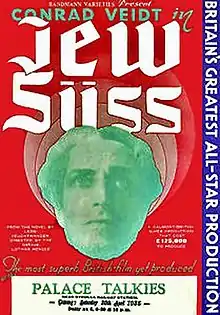Jew Süss (1934 film)
Jew Süss is a 1934 British historical romantic drama film based on Lion Feuchtwanger's 1925 novel Jud Süß, about Joseph Süß Oppenheimer. Directed by Lothar Mendes, the film stars German actor Conrad Veidt in the role of Oppenheimer. The screenplay was written by Dorothy Farnum and Arthur Rawlinson.[3]
| Jew Süss | |
|---|---|
 1934 UK cinema poster | |
| Directed by | Lothar Mendes |
| Screenplay by | |
| Based on | Jud Süß (novel) by Lion Feuchtwanger |
| Produced by | Michael Balcon |
| Starring | Conrad Veidt |
| Music by | |
| Distributed by | Gaumont-British |
Release dates |
|
Running time | 105 minutes |
| Country | United Kingdom |
| Language | English |
| Budget | £120,000[2] |
Unlike the Nazis' antisemitic film Jud Süß (1940), the British film was intended to be sympathetic to Jews, and is generally considered to be a faithful adaptation of Feuchtwanger's novel.[4] It was hoped the historical analogy, condemning antisemitism in 1730, would be a successful means of evading the ban by the British censors on political topics in films.[5]
The latter film with the same title, produced in Nazi Germany, is considered by some to be an antisemitic response to Mendes' philosemitic film.[6]
Cast
- Conrad Veidt as Josef Süss Oppenheimer[7]
- Benita Hume as Marie Auguste[7]
- Frank Vosper as Karl Alexander[7]
- Cedric Hardwicke as Rabbi Gabriel[7]
- Gerald du Maurier as Weissensee[7]
- Paul Graetz as Landauer[7]
- Joan Maude as Magdalen Sibylle[7]
- Pamela Mason as Naomi[7]
- Haidée Wright as Michelle Süss[7]
- Eva Moore as Jantje[7]
- Campbell Gulan as the Prince of Thurn and Taxis[7]
- Sam Livesey as Harprecht[7]
- Joseph Markovitch as Seligman[7]
- Selma Vaz Dias as Frau Seligman[7]
- Lucius Blake as Ottman[7]
- Marcelle Rogez as Graziella[7]
- Randle Ayrton as Schoolmaster[7]
- P. Kynaston Reeves as Judge[7]
- Percy Parsons as Pflug
- James Raglan as Lord Suffolk
- Dennis Hoey as Dieterle
- Hay Plumb as Pfaeffle
- Francis L. Sullivan as Remchingen
Release
The film premiered simultaneously at the Tivoli Cinema on the Strand in London and Radio City Music Hall in New York on 4 October 1934, with Prince George and Queen Maria of Romania being the guests of honour at the UK premiere. A blurry telephoto picture of Prince George attending the London premiere was shown for the audience in New York, which – due to the time zone difference – saw the film some five hours later. According to The Times correspondent, "the reproduction was indistinct, but the picture was notable as the first attempt to use a radio photograph (see wirephoto) on the screen".[8] The film was retitled Power for the US release.[9]
References
- Article in The Times, 6 October 1934, page 10: "Jew Süss" Reception in New York – found in The Times Digital Archive 2013-11-03
- D., C. "An Important Experiment", The Sunday Times [London, England] 7 Oct. 1934: 7. The Sunday Times Digital Archive. Web. 18 Apr. 2014.
- Ian Wallace (1 January 2009). Feuchtwanger and film. Peter Lang. p. 153. ISBN 978-3-03911-954-7. Retrieved 2 December 2011.
- Sadoul, Georges; Morris, Peter (1 September 1972). Dictionary of films. University of California Press. p. 170. ISBN 978-0-520-02152-5. Retrieved 2 December 2011.
- Clark, Anthony (2003–14). "Jew Süss (1934)". BFI Screenonline. Retrieved 3 April 2020.
- "Controversial Nazi film released in Germany". BBC News. 23 September 2010. Retrieved 7 December 2012.
- Tegel, Susan (2011). "Filmography". Jew Suss: Life, Legend, Fiction, Film. A&C Black.
- Articles in The Times on 5 and 6 October, pp. 12 and 10 respectively – found in The Times Digital Archive 3 November 2013
- Biederman, Patricia Ward (3 February 1991). "Infamous but Seldom-Seen Films of the Third Reich Will Get a Rare Screening". Los Angeles Times. Retrieved 3 April 2020.
External links
- Jew Süss at the British Film Institute
- Jew Süss at IMDb
- Two Films About Jud Süss Archived 2 March 2012 at the Wayback Machine essay by Edgar Feuchtwanger, nephew of Lion Feuchtwanger